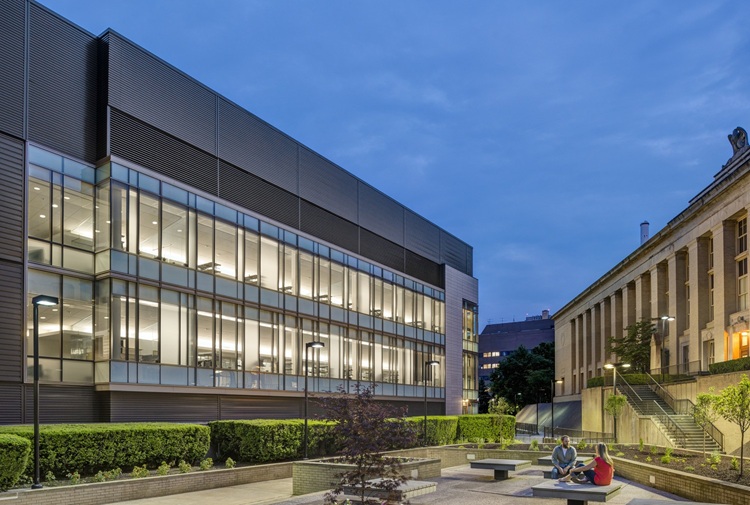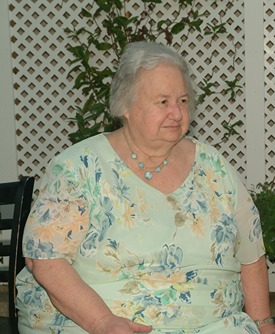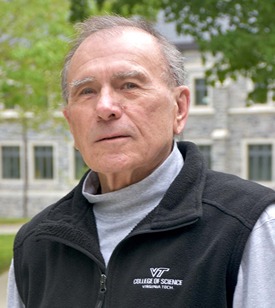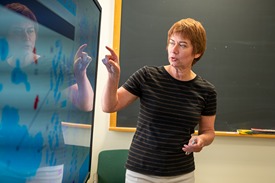The 2024 Distinguished Alumni Awards Ceremony & Dinner
took place on Friday, September 27th, 2024.

We are delighted to honor five chemistry alumni by bestowing upon each of them a Department of Chemistry Distinguished Alumni Award. Their accomplishments and contributions are a testament to their talents and to the education and training they received at the University of Pittsburgh.
The 2024 awardees
Rochelle Abrams (BS 1963, PhD 1967)
As a grade school student visiting the planetarium in her hometown Pittsburgh, Pennsylvania, young Rochelle (then Braunstein) Abrams was captivated by the prospect of humans venturing to the moon and beyond. She eventually went on to earn a BS Magna Cum Lauda in Chemistry (1963) and a PhD in Quantum Mechanics (1967), both from the University of Pittsburgh. Dr. Abrams spent the bulk of her career -- over 45 years -- supporting the US Space program, primarily by developing, designing, testing and maintaining flight software for the NASA Goddard Space Flight Center. One of her primary projects was supporting the Polar Operational Environmental Satellite (POES) Project which provides high quality weather and climate data to NOAA. NOAA weather data is used by over 50% of the U.S. public in the form of daily weather forecasts. Global data about the earth collected by POES is used to monitor the environment and trend changes over time. Dr. Abrams also supported the Hubble Space Telescope and the Space Telescope Data Archive and Distribution System. Through the course of her work, Dr. Abrams received numerous performance awards and commendation letters from NASA Goddard, and their prime contractor, Boeing.
While she was still an undergraduate at Pitt, Rochelle married Marshall Abrams, a graduate of Carnegie Mellon University and a doctoral student at Pitt. After both received their PhDs from Pitt, they moved to Silver Spring, MD, where Dr. Rochelle Abrams still resides today. Drs. Abrams celebrated their 57th wedding anniversary shortly before Marshall's death in 2020. Dr. Abrams has two daughters.
To carry on her legacy, she and Dr. Marshall Abrams established the Dr. Rochelle Abrams Space Across the Curriculum Educator Scholarship Training Program to train and support teachers in exciting and educating school children about space.
 Robert J. Bodnar (BS 1975)
Robert J. Bodnar (BS 1975)
Robert J. (Bob) Bodnar is the University Distinguished Professor in the Department of Geosciences at Virginia Tech. Bob grew up in McKeesport, PA, at a time when it was a vibrant steel manufacturing hub. He was always interested in science and decided to pursue a degree in chemistry at Pitt. Along the way, Bob also became interested in geology, and merged these two interests to earn a PhD in geochemistry from Penn State University. Bodnar’s research applies fundamental chemical principles to better understand how the Earth works, and includes studies of deposits containing gold, silver, copper, rare earth elements, and other metals that provide the raw materials needed by our modern technology-based society. Other areas of research include studies of active volcanoes to better predict future eruptions, and studies of extraterrestrial samples to search for environments that might be conducive to the development and survivability of life. Bob's research spans the fields of organic and inorganic chemistry. The tools and methods employed include Raman and infrared spectroscopy, electron microprobes, ion microprobes and other analytical instruments, accompanied by rigorous thermodynamic analyses of various chemical systems. In recognition of his research accomplishments, Bodnar was awarded the Society of Economic Geologists Lindgren Award and Silver Medal, the American Geophysical Union’s N. L. Bowen Award, the Thomas Jefferson Medal from the Virginia Museum of Natural History, and was named Virginia’s Outstanding Scientist in 2010. Bodnar is an elected member of the U.S. National Academy of Sciences and the Virginia Academy of Science, Engineering and Medicine.
Amanda Garner (PhD 2008)
Amanda L. Garner is a tenured Associate Professor in the Department of Medicinal Chemistry and Director of the Interdepartmental Program in Medicinal Chemistry at the University of Michigan. Dr. Garner is a native of St. Marys, PA and received her undergraduate degree in Chemistry from Allegheny College in Meadville, PA. After completing REU studies at the University of Pittsburgh, she went on to receive her Ph.D. in Chemistry from the University of Pittsburgh working in the laboratory of Prof. Kazunori Koide. She later completed NIH-funded postdoctoral studies at The Scripps Research Institute in the laboratory of Prof. Kim Janda. Dr. Garner began her independent career in 2013 at the University of Michigan and her research integrates chemical biology, medicinal chemistry, and molecular and cellular biology approaches for early-stage drug discovery efforts with a primary focus on validating new therapeutic targets in RNA biology. For her research accomplishments, she was awarded Catalyst Awards from the Falk Medical Research Trust in 2016 and 2022, named a Rogel Scholar from the Rogel Cancer Center in 2022, and awarded the David W. Robertson Award from the ACS Division of Medicinal Chemistry in 2022 and Ono Pharma Breakthrough Science Initiative Award in 2023. In addition to her research, Dr. Garner is committed to giving back to the scientific community. She currently serves as an editor or as an editorial board member for many leading journals in the fields of medicinal chemistry and chemical biology, is a standing member of an NIH study section, and is an active member of the ACS Division of Medicinal Chemistry.
 Maria G. Kurnikova (PhD 1998)
Maria G. Kurnikova (PhD 1998)
I came to Pittsburgh as a graduate of Moscow Institute of Physics and Technology, a Russian equivalent of MIT. It was right after the Soviet Union broke. There were three first-ever Russian graduate students in the Chemistry department: Igor Kurnikov and I were theoreticians, and Natalya Balabai was an experimentalist. At the department, we were looked at as if we were Martians. We all were also very good, so the department accepted graduate students from the former Soviet Union without hesitation for several more years. I worked towards a PhD degree under Prof. Rob Coalson's advice and in collaboration with Prof. David Waldeck. The Silicon Graphics workstations were a big thing then. David Waldeck had one, so I sat in his basement lab. Rob sometimes asked David whether I still existed – I guess it was a precursor of modern remote work. I am a professor at Carnegie Mellon now; I barely see my graduate students because everyone floats in cyberspace. While working with Rob Coalson, we developed a theory to predict currents through biological ion channels. I received the Mellon Graduate Fellowship twice; it was a huge $13K, which helped because we had a child in kindergarten. In 1998, I did a postdoc with Abraham Nitzan in Tel Aviv, Israel, another under David Beratan, then became an Assistant Professor at the Marquette University in Milwaukee, Wisconsin. I returned to Pittsburgh in 2003 to join the chemistry department at CMU. Pittsburgh is the city where I lived the longest. Currently, I work on in silico drug design.
Corey Stephenson (PhD 2005)
Corey was born in Collingwood, Ontario, Canada and received his undergraduate degree from the University of Waterloo in 1998. He completed graduate studies under the direction of Professor Peter Wipf at the University of Pittsburgh before joining the lab of Professor Erick M. Carreira at ETH Zürich. In September 2007, he joined the Department of Chemistry at Boston University as an Assistant Professor and was granted tenure and promoted to Associate Professor in February, 2013. In July 2013, he joined the Department of Chemistry at the University of Michigan as Associate Professor of Chemistry. In September 2015, Corey was promoted to full Professor. In June 2024, he began his new appointment as the Canada Excellence Research Chair in Innovative Synthetic Methods for Translational Chemistry in the Departments of Chemistry, and Biochemistry and Molecular Biology.
Since starting his independent career in 2007, he has been the recipient of a number of awards for contributions to the advancement of synthetic organic chemistry, including the Thieme Synlett/Synthesis Journal Award (2009), the Boehringer–Ingelheim New Investigator Award (2010), an NSF CAREER award (2011–2016), the Alfred P. Sloan Research Fellowship (2011-2013), the Amgen Young Investigator Award (2011), the Novartis Early Career Award in Organic Chemistry (2012–2015), the Eli Lilly Grantee Award (2013–2015) the Camille Dreyfus Teacher-Scholar Award (2013), the EROS Best Reagent Award (2014), the Pfizer Green Chemistry Award (2015), the American Chemical Society’s Arthur C. Cope Scholar Award (2020), the Imes and Moore Mentorship Award from the University of Michigan (2020), and the Contributions to Science Alumni Award from the University of Waterloo. In addition, I am Associate Editor of Beilstein Journal of Organic Chemistry and I belong to the Editorial Advisory Board of several internationally recognized chemistry journals including Chem (Cell Press), Organic and Biomolecular Chemistry (RSC), Helvetica Chimica Acta (SCS), ACS Organic and Inorganic Au, and Advanced Synthesis and Catalysis (Wiley).
The biennial Alumni Award Celebration is a cherished event that provides opportunities for our awardees to interact with the Department faculty, students, and staff. Through two days of roundtable discussions, department tours, and informal meetings, the awardees inspire graduate and undergraduate students by their accomplishments in many spheres. They are presented with the awards at a dinner with faculty and staff.
For current and past recipient profiles, please visit our archive list.
